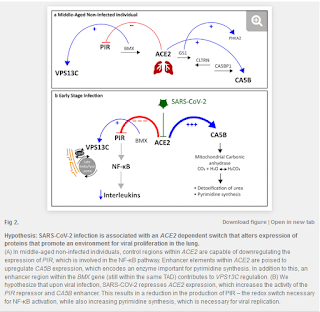SARS-CoV-2 induced expression changes in ACE2 and associated genes
[2020-07-07]
 |
| Fadason et al. (2020) |
A preprint by Fadason et al. [1] discusses a mechanism by which SARS-CoV-2 could alter gene expression of ACE2 and associated genes and produce a host environment that favors its replication. In doing so, it looks like the virus not only 'takes out' ACE2 by binding with its catalytic domain (see update below), it may also decrease ACE2 expression. I am not familiar with this type of alteration of chromatin structure and I don't know how long lasting the changes could be. Some epigenetic alterations can be quite long lasting, even multi-generational.
Several genes in the network that are also affected impact lipid metabolism and gluconeogenesis. Gluconeogenesis can also be a response to hypoxia [2] and is a common feature of the acute phase response in both infection and injury [5].
The article does not discuss changes in collectrin expression. The collectrin and ACE2 genes are located on the X chromosome; collectrin is an ACE2 homologue and there is some shared functionality. It does not have the ACE2 catalytic domain and so (I presume) would not serve as a receptor for SARS-CoV-2. Collectrin is involved in insulin secretion and is implicated in the development of salt-sensitive hypertension. It may participate in trafficking Na/K ATPase to the plasma membrane [3,4].
It would be interesting to know if of SARS-CoV-2 has an effect on collectrin.
[2020-07-09]
__
1 -
Fadason, Tayaza, Sreemol Gokuladhas, Evgeniia
Golovina, Daniel Ho, Sophie Farrow, Denis Nyaga, Hong Pan, et al. “A
Transcription Regulatory Network within the ACE2 Locus May Promote a
Pro-Viral Environment for SARS-CoV-2 by Modulating Expression of Host
Factors.” BioRxiv, April 25, 2020, 2020.04.14.042002. https://doi.org/10.1101/2020.04.14.042002.
2 -
Martínez, Mery L., Christie Landry, Ryan Boehm, Steve Manning, Ann Oliver Cheek, and Bernard B. Rees. “Effects of Long-Term Hypoxia on Enzymes of Carbohydrate Metabolism in the Gulf Killifish, Fundulus Grandis.” The Journal of Experimental Biology 209, no. Pt 19 (October 2006): 3851–61. https://doi.org/10.1242/jeb.02437.
3 -
Bernardi, Stella, Christos Tikellis, Riccardo Candido, Despina Tsorotes, Raelene J. Pickering, Fleur Bossi, Renzo Carretta, Bruno Fabris, Mark E. Cooper, and Merlin C. Thomas. “ACE2 Deficiency Shifts Energy Metabolism towards Glucose Utilization.” Metabolism - Clinical and Experimental 64, no. 3 (March 1, 2015): 406–15. https://doi.org/10.1016/j.metabol.2014.11.004.
4 -
Yasuhara Akihiro, Wada Jun, Malakauskas Sandra M., Zhang Yanling, Eguchi Jun, Nakatsuka Atsuko, Murakami Kazutoshi, et al. “Collectrin Is Involved in the Development of Salt-Sensitive Hypertension by Facilitating the Membrane Trafficking of Apical Membrane Proteins via Interaction With Soluble N-Ethylmaleiamide-Sensitive Factor Attachment Protein Receptor Complex.” Circulation 118, no. 21 (November 18, 2008): 2146–55. https://doi.org/10.1161/CIRCULATIONAHA.108.787259.
5 -
Research, Institute of Medicine (US) Committee on Military Nutrition. Infection and Injury: Effects on Whole Body Protein Metabolism. The Role of Protein and Amino Acids in Sustaining and Enhancing Performance. National Academies Press (US), 1999. https://www.ncbi.nlm.nih.gov/books/NBK224630/.
Comments
Post a Comment